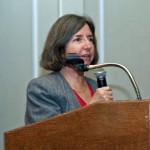Herman Cain Walks Away with P5
At 37%, Herman Cain collected more votes at the Florida Straw Poll than both Mitt Romney and Rick Perry combined. How did this happen?
Most delegates came to the P5 convention with a pretty good idea of who they were going to support, and like the national polls would indicate, Rick Perry and Mitt Romney were the overwhelming favorites. In my case, I had pretty much decided to join the Perry campaign after the convention and was seeking a confirmation of that decision.
On Thursday, all the candidates appeared at Ralph Reed’s Faith and Freedom gathering. Perry did OK, giving a variation of his stump speech (“First, don’t spend all the money..”). Most of the others were predictable and although Cain was inspiring, he didn’t really register with me. That evening, at the Fox/Google debate, most candidates held their ground, but Perry faltered badly in two ways. First, he insulted many people on the in-state tuition for illegal aliens issue by saying that if you opposed it you “didn’t have a heart”. Second, a seemingly rehearsed attack on Mitt Romney over flip-flops dissolved into a puddle of incoherence. Not good. Herman Cain again did very well but did not register as I was still working out how to overlook Perry’s problems and rationalize my support for him.
On Friday, at the CPAC conference, Perry had ample opportunity to better explain his tuition stance but declined to do so. He could have explained that unlike the federal Dream Act, in Texas it involves no amnesty and simply applies the in-state rules to “residents”. Furthermore, it was passed with an overwhelming majority in the legislature and many other states provide the same kind of program. (I was still rationalising my support). Once again, Herman Cain was impressive.
On Saturday morning, we attended the Rick Perry breakfast. This would be the fourth time to see him and another chance at redemption. The breakfast was impressive – a full fancy buffet, and there was seating for over 1000. By my count, about 500 were in attendance and many of the seats were empty. After a while, the candidate entered from the corner of the large room and was immediately mobbed by press and eager supporters as he slowly made his way toward the center of the room. It had been announced that he would “greet everyone personally” and many of us waited for him to make his way to our side of the room. After 45 minutes of this he had not crossed the center line of the room and those on our side were visibly annoyed that they were sitting on their hands waiting for the guy. Finally, he makes for the stage and delivers 8 minutes of warmed over remarks (“First don’t spend all the money”). Four chances, four flops. Finally we have crossed the line and start thinking about which other candidate to support, but we will give him one more chance in his afternoon speech before the straw poll.
Not. By the afternoon, Rick Perry was on his way to Michigan and left a “surrogate” to speak for him. Scratch Rick Perry from further consideration.
That left (for me) Herman Cain, Michele Bachmann and Rick Santorum. Mitt Romney stopped being a choice long ago for many reasons too long to go into here. The others are clearly not in the same league. So we listened to the speeches with an open mind. Cain, Santorum and Gingrich had stayed to deliver their closing remarks, others had surrogates, Bachmann and Romney did not participate. Many around us were having second thoughts about Perry as well, particularly those with a “tea party” orientation. The more mainstream Republicans were comfortably in the Romney camp.
When Herman Cain made his remarks, the room came alive. This is what we were waiting for since Thursday. In my notes I wrote: Broad coverage of the issues, executive style, ARTICULATED VISION, powers of persuasion, and projection of leadership. He pressed all the right (conservative) buttons, but did it in a way that was clear, concise, motivating and persuasive. You could see this guy standing next to Barack Obama and wiping the stage with him. The excitement was palpable.
At that point I decided to vote for Herman Cain. Taking to heart Andrew Brietbart’s advice to not let the media define who is “electable”, I voted my heart. He may not win the nomination or even the Florida primary as there is a rough ride ahead, but now, today, this is a man who can be President.
Watch the video from the Saturday event and decide for yourself:
Part 1
Part 2
Call to Action – County Budget Meeting, 9/13/11
This is a call to action for next week’s county budget hearing, Tuesday evening, 9/13/11 at 6:00pm. The meeting is in the county government center, 301 North Olive in West Palm Beach. Come early as the meeting is expected to be crowded.
As you prepare for the meeting, here are some resources that may be useful:
- September Talking Points
- Sample email and 3 minute remarks
- The 2012 TAB Proposal – September Update
- September Budget Hearings – Some Background
Also check the “News Articles” tab on the TAB website for the latest budget stories from the Palm Beach Post, Sun Sentinel, and others.
Those on the “receiving” side of the budget will be out in force. Those of us on the “paying” side must also have their voices heard. If you can’t attend, send an email. Addresses for the commissioners and administrator can be found on right side of the TAB website, or you can email all at once at: BCC-AllCommissioners@pbcgov.org.
For some specific details about this meeting, see the 9/9 TAB email.
Labor Day: A brief history of the celebration of Labor Day
HOW LABOR DAY CAME ABOUT; WHAT IT MEANS
 “Labor Day differs in every essential from the other holidays of the year in any country,” said Samuel Gompers, founder and longtime president of the American Federation of Labor. “All other holidays are in a more or less degree connected with conflicts and battles of man’s prowess over man, of strife and discord for greed and power, of glories achieved by one nation over another. Labor Day…is devoted to no man, living or dead, to no sect, race, or nation.”
“Labor Day differs in every essential from the other holidays of the year in any country,” said Samuel Gompers, founder and longtime president of the American Federation of Labor. “All other holidays are in a more or less degree connected with conflicts and battles of man’s prowess over man, of strife and discord for greed and power, of glories achieved by one nation over another. Labor Day…is devoted to no man, living or dead, to no sect, race, or nation.”
Labor Day, the first Monday in September, is a creation of the labor movement and is dedicated to the social and economic achievements of American workers. It constitutes a yearly national tribute to the contributions workers have made to the strength, prosperity and well-being of our country.
Founder of Labor Day
More than 100 years after the first Labor Day observance, there is still some doubt as to who first proposed the holiday for workers.
Some records show that Peter J. McGuire, general secretary of the Brotherhood of Carpenters and Joiners and a co-founder of the American Federation of Labor, was first in suggesting a day to honor those “who from rude nature have delved and carved all the grandeur we behold.”
But Peter McGuire’s place in Labor Day history has not gone unchallenged. Many believe that Matthew Maguire, a machinist, not Peter McGuire, founded the holiday. Recent research seems to support the contention that Matthew Maguire, later the secretary of Local 344 of the International Association of Machinists in Paterson, N.J., proposed the holiday in 1882 while serving as secretary of the Central Labor Union in New York. What is clear is that the Central Labor Union adopted a Labor Day proposal and appointed a committee to plan a demonstration and picnic.
The First Labor Day
The first Labor Day holiday was celebrated on Tuesday, September 5, 1882, in New York City, in accordance with the plans of the Central Labor Union. The Central Labor Union held its second Labor Day holiday just a year later, on September 5, l883.
In l884 the first Monday in September was selected as the holiday, as originally proposed, and the Central Labor Union urged similar organizations in other cities to follow the example of New York and celebrate a “workingmen’s holiday” on that date. The idea spread with the growth of labor organizations, and in l885 Labor Day was celebrated in many industrial centers of the country.
Labor Day Legislation
Through the years the nation gave increasing emphasis to Labor Day. The first governmental recognition came through municipal ordinances passed during 1885 and 1886. From them developed the movement to secure state legislation. The first state bill was introduced into the New York legislature, but the first to become law was passed by Oregon on February 2l, l887. During the year four more states — Colorado, Massachusetts, New Jersey, and New York — created the Labor Day holiday by legislative enactment. By the end of the decade Connecticut, Nebraska, and Pennsylvania had followed suit. By 1894, 23 other states had adopted the holiday in honor of workers, and on June 28 of that year, Congress passed an act making the first Monday in September of each year a legal holiday in the District of Columbia and the territories.
A Nationwide Holiday
The form that the observance and celebration of Labor Day should take were outlined in the first proposal of the holiday — a street parade to exhibit to the public “the strength and esprit de corps of the trade and labor organizations” of the community, followed by a festival for the recreation and amusement of the workers and their families. This became the pattern for the celebrations of Labor Day. Speeches by prominent men and women were introduced later, as more emphasis was placed upon the economic and civic significance of the holiday. Still later, by a resolution of the American Federation of Labor convention of 1909, the Sunday preceding Labor Day was adopted as Labor Sunday and dedicated to the spiritual and educational aspects of the labor movement.
The character of the Labor Day celebration has undergone a change in recent years, especially in large industrial centers where mass displays and huge parades have proved a problem. This change, however, is more a shift in emphasis and medium of expression. Labor Day addresses by leading union officials, industrialists, educators, clerics and government officials are given wide coverage in newspapers, radio and television.
The vital force of labor added materially to the highest standard of living and the greatest production the world has ever known and has brought us closer to the realization of our traditional ideals of economic and political democracy. It is appropriate, therefore, that the nation pay tribute on Labor Day to the creator of so much of the nation’s strength, freedom, and leadership — the American worker.[Source: United States Department of Labor]
Illegal Immigration in Florida: Conservative Solutions to a Growing Problem
RCPB Immigration Invitation Oct 2011
As Republicans, we believe that the state of Florida, like our nation, is in desperate need of immediate and drastic improvements in in our immigration enforcement policies. At the same time, we are cognizant of the potential and often-unintended impact that government regulation of Florida businesses can have on economic growth, job creation, and prosperity for all Floridians. We hope to offer and informed and engaging discussing of the various conservative perspectives on this ever-evolving issue, to promote the sort of effective and functional immigration policies that will serve as a conservative model for other states.
We hope that this forum will not function as a debate. Instead, we hope to foster an intelligent discussion about the different conservative perspectives on the interests at stake in our ongoing immigration discussions. We recognize that not all conservatives will agree on all subjects. Nonetheless, we hope to embrace differing conservative viewpoints, so that we as an audience, and as a Party, can come to more fully appreciate this complex issue which affects us all. Won’t you please join us
Thursday, October 27, 2011 5:30 Meet & Greet 6:30 Program Begins $20 Members and Guests Bear Lakes Country Club 1901 Village Blvd West Palm Beach, FL 33401 RSVP info@gopclubpb.orgPBC Charter Review – Call to Action – Deadline August 26th
Back in June, the County began public meetings about its ongoing Charter Review. If you recall – the County Charter is its ‘constitution’ and describes Home Rule. There are 20 Home Rule or Charter Counties in Florida. Palm Beach County does not have a formalized Charter Review process, and this is the first comprehensive review to have taken place.
The Charter and the county’s charter review website can be found here. While there are a few changes that the Commissioners would like, citizens can input their own suggestions via the County Website. Suggestions are limited to 300 words per suggestion. Here is a link to the survey page. You can make as many submissions as you like.
Personally, I am not in favor of a few changes favored by several of the Commissioners – a) changing the county commission makeup to include a few at-large commission districts, and b) to have non-partisan elections for County Commissioners.
I have a few changes that I am submitting in order to make for better governance without bogging down the document or specifying so much detail that the slim charter becomes unmanageable. You may have others. If you would like to submit any of the ones listed below, just click on the [copy] to the right of the suggestion you would like to copy, and then cut/paste from the text that comes up and submit that to the survey link above. Each of my submissions are shorter than the 300-word limit per submission.
Friday, August 26, is the last date on which submissions will be accepted on the county website.
Review all boards and advisory committees every four years
Objective: Formalizes a review process to remove unnecessary, redundant, or obsolete Boards and Advisory Committees.
Precedent and wording from Broward County Section 2.09 F
The County Commission shall adopt procedures to provide for the review of the performance of all Boards, Committees, Authorities and Agencies at least once every four (4) years. As part of its review of the respective Board, Committee, Authority or Agency, the County Commission shall determine, by resolution, that the applicable Board, Committee, Authority, or Agency is needed to serve the public interest, and the cost of its existence to the citizens and taxpayers is justified. The review provision shall not apply to any Board, Committee, Authority, or Agency established by this Charter.
County Version of Smartcap (this is a TAB proposal)
Objective: Limits spending growth to population growth and inflation formula
Reference: State Revenue Limitation (CS/SJR958). The yearly adjustment factor is calculated based on the previous year’s cap, not revenue collected. This avoids the problem encountered by Colorado “TABOR” which caused excessive reductions in spending during an economic downturn.
Precedent: Brevard 2.9.3.1(a): http://www.brevardcounty.us/countycharter/charter-article2.cfm – s29 and City of Jacksonville Sections 14.08/14.09: http://library.municode.com/index.aspx?clientID=12174&stateID=9&statename=Florida
Suggested wording: 1) For each budget year, county revenue collected is limited by the state computed adjustment factor defined in CS/SJR958. 2) Exemptions are allowed for unfunded mandates and certain other classifications of spending. 3) Emergency override is permitted with a super majority vote of the BCC.
Periodic Mandatory Review of the Charter by Independent Commission
Objective: Formalize the review of County Charter, instead of the ad hoc approach being taken during the current county review.
Precedent: 16 of the 20 Home Rule counties have a formal appointed* Charter Review Commission specified in their Charters. Period ranges from every 4 years to every 10 years. Size of Commission ranges from 10-15 individuals, with majority or 2/3 vote required to bring an amendment forward, and most scheduled to coincide with General Elections. *Sarasota County has an elected Charter Review Commission
Recommendation: Modify the charter to require a Formal review, by appointed review commission consisting of citizens, with an odd number of commissioners and majority vote, every 8 years, with results to coincide with a general election.
Debt Policy
Objective: Transparency and Accountability
Precedent: Charlotte County Sec 2.2.J
http://library.municode.com/index.aspx?clientID=10526&stateID=9&statename=Florida
Text from Charlotte County:
The county commission shall adopt and review annually, prior to April first of each year, a debt policy to guide the issuance and management of debt. The debt policy shall be integrated with other financial policies, operating and capital budgets. Adherence to a debt policy helps ensure that debt is issued and managed prudently in order to maintain a sound fiscal position and protect credit quality. Elements to be addressed in the debt policy shall include:
(1)The purposes for which debt may be issued.
(2)Legal debt limitations, or limitations established by policy (maximum amount of debt that should be outstanding at one time).
(3)The types of debt permitted to be issued and criteria for issuance of various types of debt.
(4)Structural features of debt (maturity, debt service structure).
(5)Credit objectives.
(6)Placement methods and procedures.
State of the County Quarterly/Annual Report
Objective: Transparency and Accountability by the administrative branch of the county
Precedent: Broward County 1.04 L: http://library.municode.com/index.aspx?clientID=10288&stateID=9&statename=Florida
Lee County: 2.3.A.1.(a): http://library.municode.com/index.aspx?nomobile=1&clientid=10131
The County Commission shall require and the public is entitled to have access to a Management Report published by the County Administrator, and made public on a quarterly basis, detailing the performance of the County government offices, divisions and departments. The Management Report shall include, but not be limited to, a report on the receipt and expenditure of County funds by each County office, division and department, and a report of the expected and actual performance* of the activities of each County office, division and department.
*Performance shall include measurements (benchmark metrics like head counts against peer counties) in key areas/contingent liabilities for long term union contracts and capital projects/annual market comparison of salaries and benefits (peer counties and private sector), other issues.
Senate President Haridopolis Highlights July Lunch
The July RCPB lunch featured Mike Haridopolis who was well received as President of the Senate, even if he has ended his Senate campaign.
As previously reported, he recognized that the importance of leading the FL Senate would require more time than allowed by being a candidate for US Senate. He vowed that he would not be running for any office while holding his present position.
Of interest to many in the group, he answered a question about the disposition of the E-Verify bill that did not pass the legislature, or even emerge from the Senate committees for a vote. This was the perfect segue into the fact that our club will present a program on Thurs. Oct 27 on the merits of E-verify with organizations and local businesses who are pro/con.
The event was attended by several new members who enjoyed the program enough to comment: “I am so impressed with your speakers and programs that I want to be a part of your club.”
Here’s a few pictures from Delia:
RCPB Welcomes Sen President Mike Haridopolois
 Please join RCPB on Wednesday, July 27th as we are joined by Senate President and US Senate Candidate Mike Haridopolois. Mike is a conservative reformer who has transformed government in Florida. A graduate of Stetson University and the University of Arkansas, Mike has served in the Florida Legislature since 2000 with special introduction by RCPB Member, Senator Ellyn Bogdanoff.
Please join RCPB on Wednesday, July 27th as we are joined by Senate President and US Senate Candidate Mike Haridopolois. Mike is a conservative reformer who has transformed government in Florida. A graduate of Stetson University and the University of Arkansas, Mike has served in the Florida Legislature since 2000 with special introduction by RCPB Member, Senator Ellyn Bogdanoff.
“I promise to stay true to the ideals and principles of our Founding Fathers in this campaign. I promise to be a spokesman for a Constitutional, conservative vision of our great nation. And I promise to speak out for ideas that can revitalize our economy by empowering individuals, not governments, and by preserving opportunity for families and innovators, and not power for bureaucrats and politicians” states Mike Haridopolois.
Wednesday, July 27th Bear Lakes Country Club 1901 Village Boulevard West Palm Beach, FL 33409 Members $20.00 Guests $25.00 Meet & Greet 11:30 am Program Begins 12:00 RSVP: (561)804-4591 or info@gopclubpb.org NOTE: There will be NO lunch meeting in August.Former Ambassador Al Cardenas Highlights June Lunch Meeting
On Wednesday, June 22 at Bear Lakes, Keynote speaker Al Cardenas of the American Conservative Union, gave his views on current events and emphasized how important it is to stand on principles, such as boldly supporting the Ryan budget, given it is the only “real” proposal on the table to fix our structural fiscal problems. He considers it a moderate document, since it takes 28 years to achieve balance and does not touch Social Security. We need to stand for conservative principles, both while running for election and governing. Consistency provides mandates – if you take a controversial stand and are elected on that basis, then you have a mandate to implement that position. Ambassador Cardenas also announced that a regional CPAC convention is to be held in Orlando coincident with Presidency 5.
Also noted at the meeting was the formation of a new grass roots group in the county, the Palm Beach County Tea Party. Pam Wohlschlegel, formerly county coordinator for SFTP, has formed a new group to build a coalition of activists from related organizations dedicated to fiscal responsibility, constitutionaly limited government and free markets. She pointed out that she has been a Republican since her school days, but decided to work through a non-partisan group because of their success in attracting disaffected Democrats and Independents to the conservative cause.
Also speaking were Joe Kaufman, candidate for CD20 (Debbie Wasserman Schultz), and Starla Brown, PB and Broward coordinator for the Mike McCallister for Senate campaign. The meeting was hosted by Bette Anne Starkey.
Pictures by Boris Balaban and Delia Garcia Menocal.
REC Update June 8, 2011
Last Wednesday, the Republican Executive Committee held its bi-monthly meeting at the Palm Beach County Governmental Center. The agenda for the June meeting was exciting and substantive. The REC welcomed Colonel Mike McCallister, who is running in the Republican primary and hopes to ultimately join Marco Rubio as a United States Senator from the great state of Florida. McCallister spoke of his deep concern over the expansion of Islamic fundamentalism and Sharia law, and the threats that they pose to both the United States and its allies abroad. He also expressed great passion about our nation’s fiscal status, calling for an end to the era of ever-increasing government spending. This election season is shaping up to be exciting and important, as McCalister challenges formidable Senate hopefuls, Mike Haridopolos, George LeMieux and Adam Hasner, for the chance to go to Washington and usher in a new age of robust economic growth and increased prosperity for all Americans.
The REC also took up a discussion over the issue of illegal immigration and the proposed e-verify procedures considered during the last legislative session in Tallahassee. The topic proved for a lively debate, as members expressed competing perspectives on the proposed legislation. While some touted the law as a viable and necessary means of combating illegal immigration and the associated dangers, others observed that the new law will impose upon Florida businesses an added and substantial cost of doing business which, like most government regulation over private industry, will limit the ability of Florida businesses to compete, create jobs, and grow our local economy. The debate served as a reminder of the great importance of public discourse, so that we can fully appreciate the complexity of the issues facing our society and ensure that our state and nation can move forward instead of backward in the coming election cycle.
Join us for Lobsterfest 2011
 Thursday, July 7, 2011 6 – 9pm
The Beach Club
755 North County Road
Palm Beach, FL
Tenth Annual Lobsterfest!
Spacious, cool indoor location on the OCEAN!
Hear the Latest from Honorary Chairman Jeff Atwater, Florida’s Chief Financial Officer, and other Elected Officials and Candidates
Menu:
Thursday, July 7, 2011 6 – 9pm
The Beach Club
755 North County Road
Palm Beach, FL
Tenth Annual Lobsterfest!
Spacious, cool indoor location on the OCEAN!
Hear the Latest from Honorary Chairman Jeff Atwater, Florida’s Chief Financial Officer, and other Elected Officials and Candidates
Menu:South African Lobster Tails, Chicken, Salads,
Corn on the Cob and Dessert • Cash bar$80 per person • Casual Attire
Buy your eTickets for the 10th Annual Lobster Fest- Republican Party of Palm Beach County-by clicking this link: https://www.donationtickets.com/donationticket/eventTicket.asp?guidEvent=565756



















